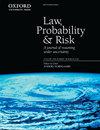算法治理?无噪声和(潜在)少偏差
IF 1.4
4区 社会学
Q1 LAW
引用次数: 15
摘要
作为直觉统计学家,人类遭受着可识别的偏见,认知和其他方面的偏见。人类也可能是“嘈杂的”,从某种意义上说,他们的判断显示出不必要的变化。因此,包括由行政检察官和审判员组成的公共机构可能会有偏见或嘈杂,或者两者兼而有之。偏差和噪声都会产生误差。算法消除噪音,这很重要;在某种程度上,他们这样做,他们防止不平等待遇和减少错误。此外,算法不使用思维捷径;他们依赖于统计预测,这意味着他们可以抵消甚至消除认知偏见。与此同时,行政机构对算法的使用引发了许多合理的问题和疑虑。除此之外,它们可以编码或使歧视永久化,也许是因为它们的输入是基于歧视的,也许是因为它们被要求预测的东西受到歧视的影响。但如果目标是消除歧视,那么合理构建的算法对行政机构来说还是大有希望的。本文章由计算机程序翻译,如有差异,请以英文原文为准。
Governing by Algorithm? No Noise and (Potentially) Less Bias
As intuitive statisticians, human beings suffer from identifiable biases, cognitive and otherwise. Human beings can also be “noisy,” in the sense that their judgments show unwanted variability. As a result, public institutions, including those that consist of administrative prosecutors and adjudicators, can be biased, noisy, or both. Both bias and noise produce errors. Algorithms eliminate noise, and that is important; to the extent that they do so, they prevent unequal treatment and reduce errors. In addition, algorithms do not use mental short-cuts; they rely on statistical predictors, which means that they can counteract or even eliminate cognitive biases. At the same time, the use of algorithms, by administrative agencies, raises many legitimate questions and doubts. Among other things, they can encode or perpetuate discrimination, perhaps because their inputs are based on discrimination, perhaps because what they are asked to predict is infected by discrimination. But if the goal is to eliminate discrimination, properly constructed algorithms nonetheless have a great deal of promise for administrative agencies.
求助全文
通过发布文献求助,成功后即可免费获取论文全文。
去求助
来源期刊

Law Probability & Risk
MATHEMATICSSTATISTICS & PROBABILITY&-STATISTICS & PROBABILITY
CiteScore
2.10
自引率
28.60%
发文量
8
期刊介绍:
Law, Probability & Risk is a fully refereed journal which publishes papers dealing with topics on the interface of law and probabilistic reasoning. These are interpreted broadly to include aspects relevant to the interpretation of scientific evidence, the assessment of uncertainty and the assessment of risk. The readership includes academic lawyers, mathematicians, statisticians and social scientists with interests in quantitative reasoning.
The primary objective of the journal is to cover issues in law, which have a scientific element, with an emphasis on statistical and probabilistic issues and the assessment of risk.
Examples of topics which may be covered include communications law, computers and the law, environmental law, law and medicine, regulatory law for science and technology, identification problems (such as DNA but including other materials), sampling issues (drugs, computer pornography, fraud), offender profiling, credit scoring, risk assessment, the role of statistics and probability in drafting legislation, the assessment of competing theories of evidence (possibly with a view to forming an optimal combination of them). In addition, a whole new area is emerging in the application of computers to medicine and other safety-critical areas. New legislation is required to define the responsibility of computer experts who develop software for tackling these safety-critical problems.
 求助内容:
求助内容: 应助结果提醒方式:
应助结果提醒方式:


